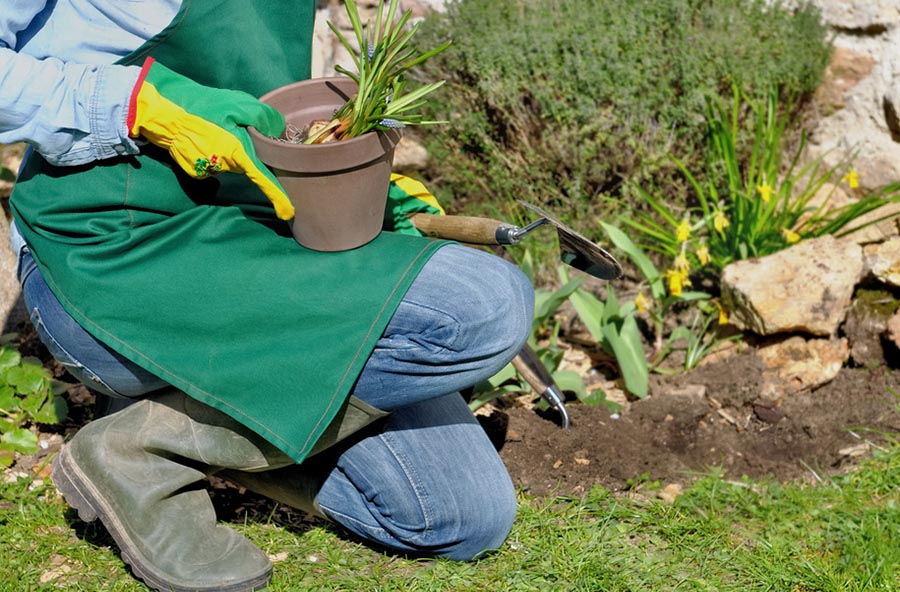Just looking out the window at a blooming garden may make you smile, but did you know that the garden might also play a role in helping you fight depression or anxiety? As far back as the 1800s, Dr. Benjamin Rush, known as the “father of American psychiatry,” apparently documented the positive effect that working in the garden had on mental illness.
Approximately 20 per cent of Canadians will personally experience a mental illness, such as anxiety or depression, during their lifetimes, says the Canadian Mental Health Association, but 49 per cent of those who feel they have experienced anxiety or depression have never sought a doctor’s aid, even though there is effective treatment available.
Today, one approach that is gaining currency is horticultural therapy (HT) and the related practice of therapeutic horticulture.
Horticultural therapy is defined as “a formal practice that uses plants, horticultural activities and the garden landscape to promote well-being for its participants. HT is goal oriented with defined outcomes and assessment procedures.”
The related practice of therapeutic horticulture (TH) “is the purposeful use of plants and plant-related activities to promote health and wellness for an individual or group. A TH program leader is trained to use horticulture to promote well-being but goals and outcomes for individual participants are not clinically documented.”
Gardening Reduces our Stress
It should probably come as no surprise that working in the garden can have benefits for mental health. After all, gardening in considered moderate exercise, and exercise increases our levels of serotonin and dopamine, the hormones that make us feel good, while it lowers our level of cortisol, a hormone associated with stress. Combining the actual work of gardening with guided, therapeutic conversation seems like a match that is tailor made for healing.
“Horticultural therapy as a treatment for many psychological and physical disorders is a valid and increasingly popular intervention,” Mitchell Hewson told USA Today.
“Horticultural therapy stimulates thought, exercises the body and encourages awareness of the external environment,” he added. “Moreover, the clients who have benefited from this type of therapy report a renewed desire to live, decreased anxiety and improved self worth.”
Gardening and PTSD
A study conducted by Ulrika Stigsdotter, a professor of landscape architecture at the University of Copenhagen in Denmark, and her colleagues and published online this year in Health Psychology Open, demonstrated that nature-based therapy also has a positive effect on war veterans suffering from post-traumatic stress disorder. Their thrice-weekly sessions lasted for 10 weeks and consisted of mindfulness activities, nature-based activities such as tree-planting or watering plants and individual therapy. “…It can be argued that the information from the interviews indicate that the NBA increased their belief in their own capacity and improved their thinking about themselves and their situation,” wrote the authors.
“The veterans experienced that their conditions and needs due to their PTSD could be remedied
by simply being in the garden, and by performing the nature-based activities. … One year after the nature-based therapy had ended, most of the veterans were still using nature and nature-based activities.”
“Just being in the garden is very peaceful and tranquil and is a wonderful stress reliever for clients and it enables them to make a positive contribution and put their worries aside as they really focus on gardening and growing their own food. It’s physically, mentally and emotionally rewarding,” Liz Kirk, the program co-ordinator told Inside Toronto. “I think being a part of something that’s productive and beautiful helps people to focus on their recovery and resilience; it’s something positive in their lives.”
Health Benefits of Gardening
Sarah Rayner, blogging for Psychology Today, suggests a number of ways that gardening can benefit our mental health:
1. We gain a sense of responsibility: “Having to care for plants is a good way to learn responsibility for other living things.”
2. We can be nurturing: “Horticulture is a great equalizer: plants don’t give a fig who is tending them and for those with mental health problems to be able to contribute to such a transformative activity can help boost self-esteem.”
3. We can relax and let go: “Tending to plants allows us to tap into the carefree part of ourselves with no deadlines, mortgage or annoying colleagues to worry about.”
4. We are reminded to live in the present: Gardens offer us beautiful sights and scents and remind us to be aware of the delights of the present moment, rather than dwelling on our worries.
So, if you’re feeling blue, seek out a horticultural therapy professional or take the smaller step of heading outdoors to pull some weeds.

Dr. Melden earned his Doctorate in Osteopathic Medicine at Philadelphia College Osteopathic Medicine and went to USC Presbyterian Hospital for his residency in Family Medicine. He then completed his Psychiatric residency at the University of California, Irvine and went to UCSD Geropsychiatry pursuing a fellowship. Dr. Melden has over 14 years of experience as a clinician specializing in treating child and adolescent, adult and geriatric clients. He has devoted his life to psychiatry in a variety of different treatment settings including in- patient and out-patient environments. He specializes in the psychiatric evaluation, complementary therapy approaches, and medical management of individuals suffering from mental illness. Currently, he maintains a private practice with Crownview Medical Group in Coronado and Carlsbad, California where he is CEO/President.


 Myriame Nicolas, PMHNP-BC
Myriame Nicolas, PMHNP-BC
 Charlie Perez, PMHNP-BC
Charlie Perez, PMHNP-BC Kimberly Umansky, FNP-C
Kimberly Umansky, FNP-C Joanne Talbot Miller, M.A., LMFT
Joanne Talbot Miller, M.A., LMFT J. Heather Fitzpatrick, LCSW
J. Heather Fitzpatrick, LCSW Agata Nowakowska
Agata Nowakowska Brianna Meacham
Brianna Meacham Maha Moses, PhD
Maha Moses, PhD Rebecca McKnight, PsyD
Rebecca McKnight, PsyD Tiffany Holm N.P.
Tiffany Holm N.P. Dede Echitey, PMHNP-BC
Dede Echitey, PMHNP-BC Apneet Mann, FNP-C
Apneet Mann, FNP-C Rachael Hueftle, NP
Rachael Hueftle, NP Kelvin Poon, MSN, PMHNP-BC
Kelvin Poon, MSN, PMHNP-BC



